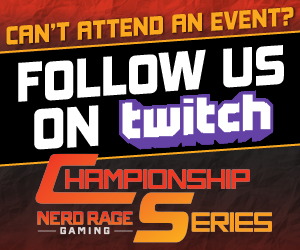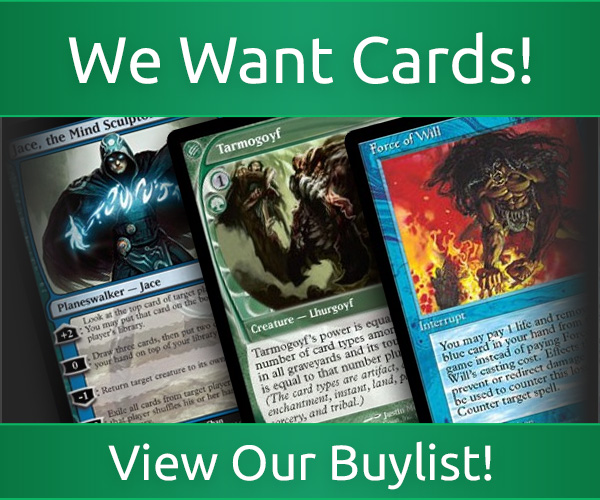Mat Bimonte: The Future of Magic
A few weeks ago I wrote about my experiences playing in a Team Constructed event. I alluded to it being the future of competitive Magic as we know it, and I’d like to dig deeper into that thought process and see what it has to offer.
Magic as an esport
For the past year or so, Wizards of the Coast has pushed the agenda that they want Magic to become an esport. While they’ve taken steps towards that in rewarding team performances at the Pro Tour level, the teams are made up of solely individual performances. The Team Constructed style is something that really implies team in the most literal sense.
pushed the agenda that they want Magic to become an esport. While they’ve taken steps towards that in rewarding team performances at the Pro Tour level, the teams are made up of solely individual performances. The Team Constructed style is something that really implies team in the most literal sense.
Now I’m not as smart as some of the people at the top, nor do I claim to be, but I would suggest to them looking at the format from a non-Unified perspective as that type of thing gets really fuzzy for new viewers and from a deck building standpoint. If they want to keep Pro Tours as Limited/Standard it would be logistically hard to do three-player teams. My suggestion is to keep the current Pro Tour formats as a promotional tool, rewarding individual play, and turning the Grand Prix Circuit into professional-level team events.
“Mat, GP’s are how casual players get into large events.” Yeah, I get it, but change is good. I’m not sure how else to explain this. Grand Prix are also becoming outrageous in cost, player numbers, and general expected value. Perhaps WOTC could move to Open style events for more casual players, players looking to grow individually, and those who are looking to network for team play. Those events could feed into the Grand Prix style of events we have now. I’m not sure exactly what the solution is, but I think trying something along those lines could be beneficial overall to player experience.
Expanding Coverage
Look, I understand that bandwidth costs at convention centers are going to be high, but could you imagine watching a Team Constructed Grand Prix where Stream A is Standard, Stream B is Modern, Stream C is Legacy? A world where most everyone is appeased? That sounds great.
Now logistically the “main stream” would be the one getting commentary, and the others would likely have no audio, but you would at least be able to watch more content. The cost is high, but I think overall for the game it would pay off. Whether it’s absorbing more viewers, getting more Twitch subscribers, or even adding sponsors for the streaming coverage, there are ways to offset the costs.
Loving/Hating Teams
Is anyone sick of watching Reid, Owen, and Huey crush everyone at team tournaments? (OK, me neither.) But seriously, some people love the juggernauts, and some people root for the underdogs. There are a ton of opportunities from a branding standpoint for teams to make money. Sell jerseys, sell wristbands, sell anything with your team logo on it. This type of thing also can create dynamic rivalries between teams meeting each other deep in tournaments more and more often as the format continues.
Enfranchised Players
Now I understand that for some players, it might be hard to break into a “dream team” if you will. That’s half of the battle of getting on the Pro Tour in the first place. The testing teams are already incredibly hard to get into, so creating your own team of friends/players is basically no different from that.
Even further, there is no guarantee that teams won’t shake up over time. Players quit the game, real-life issues happen, players can’t travel as much — there is a lot of opportunity for advancement if you are performing well across events.
Testing and Team Decisions
Yes, there is a lot more testing that needs to happen across a Team Constructed event. Instead of playing one format, you need to test three formats, and that’s a fairly obvious concern. However, in more established formats like our current Standard, there isn’t a ton of research that needs to be done. Team Constructed would reward players for expanding their knowledge in undefined formats, and proper usage of time on testing certain cards/matchups for the event.
Speaking of testing three formats, it can also be hard to test if you are in different areas. For example Kent Ketter, my teammate for the last event I played, lives about four hours away from me. Kent, Jeff Hoogland and I participate in an ongoing Discord chat, and have regular conversations almost nightly. We coordinated some times to dedicate to the event, and to go over specific card selection for the event itself.
it can also be hard to test if you are in different areas. For example Kent Ketter, my teammate for the last event I played, lives about four hours away from me. Kent, Jeff Hoogland and I participate in an ongoing Discord chat, and have regular conversations almost nightly. We coordinated some times to dedicate to the event, and to go over specific card selection for the event itself.
I have also been so insanely focused on testing before that I have set up an overheard camera and Skyped with a friend who did the same to get some testing in from afar. As with all things in life, Magic is about how dedicated you are to your craft. While this seems excessive, it’s paramount that you try to exhaust all of your resources if you want to be at the top of your game.
Team Unified can be more taxing on a team, as you would be building the three decks you are playing together so as to not overlap cards, so there could be some interest in the mechanics of deckbuilding for that format. The major problem with it is you can’t use the Unified decklists for a solo events, so the data on what decks do well would vary wildly between team and solo events.
As for actually playing together as a team, there is a weird dynamic you have to figure out. Overall, it is detrimental to micromanage each match. I sat on an end while Kent was in the middle. Kent didn’t hound me about decisions, he didn’t micromanage me, and I ended up 8-1 overall on the day. When I had a hard decision tree, I asked for help from my teammates, and together we made a decision. This happened in each format to all of us, but it wasn’t overdoing it.
A big thing people made mistakes on is that all decisions aren’t black and white. I was sure to give background on the game I was in, notable cards played/not played, and what small key tells my opponent may have given throughout the match already. This is probably the single hardest thing to get experience doing, but we quickly figured each other out, and had great chemistry as the day went on. I would enter as many tournaments as possible to build this, or even to work with others to see how they do things together.
Wrapping Up
What is the solution here? For me, playing team events seems like a great change. Playing a game with “variance by design” leads to some feel bads, but adding two other skilled players to your arsenal helps cut down on that variance. This is my single favorite aspect of team events.
I truly think that if Magic wants to continue to grow from a competitive standpoint, or grow as an esport, team events need to be reinforced. This could mean doing a trial run of a structure similar to what I posed for a year. The game of Magic has transformed greatly even just in the couple of years I have been playing the game, and I would predict the competitive landscape is the next thing to be going through a massive overhaul in the next year or so.
If you haven’t had the privilege of playing in a team event of any kind, I highly recommend rounding up a couple pals and trying one out. The experience alone is well worth the admission. See you at the next one.
Thanks for stopping by,
-Mat Bimonte
Mat Bimonte first picked up the game during Theros block, but already has a Modern 5K championship under his belt, as well as a number of smaller Standard tournament wins. Based out of Bloomington, Ill., Mat is a regular on the SCG Tour, with future aspirations of qualifying for the Pro Tour.



